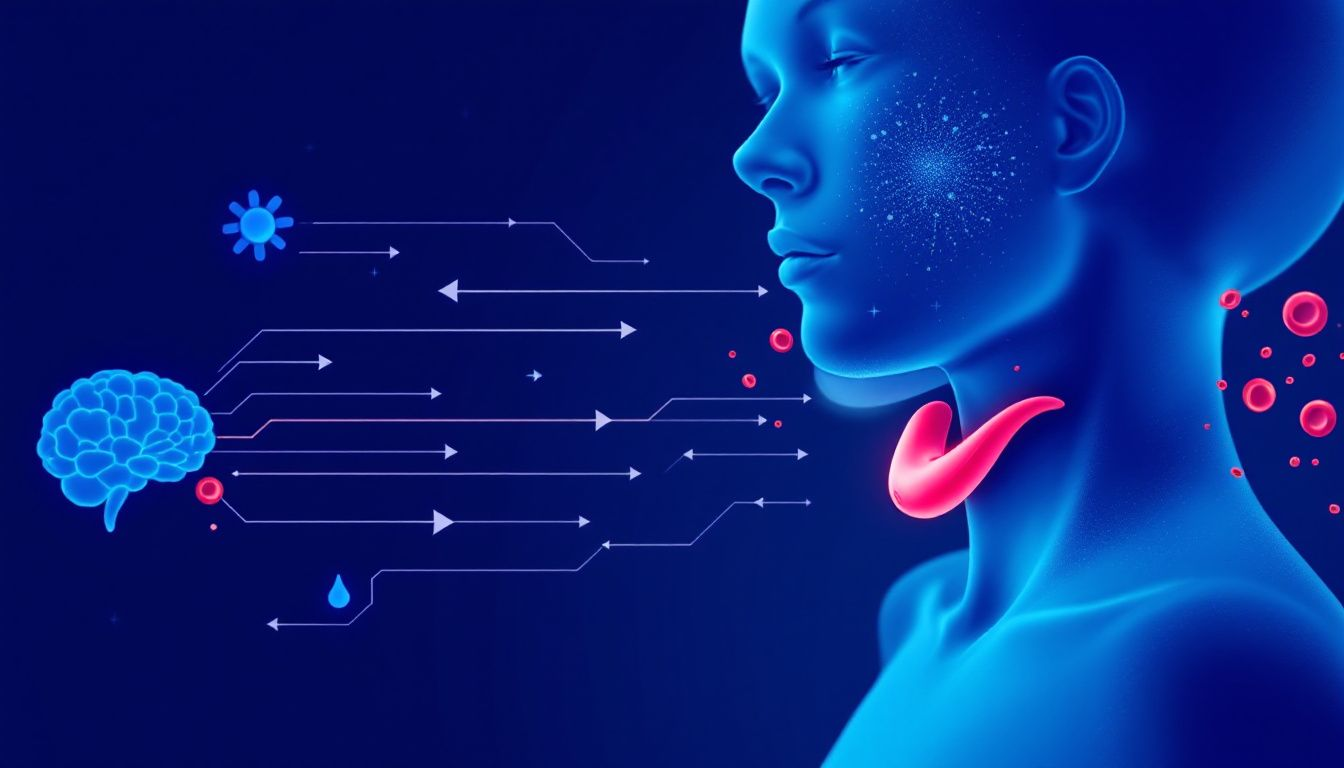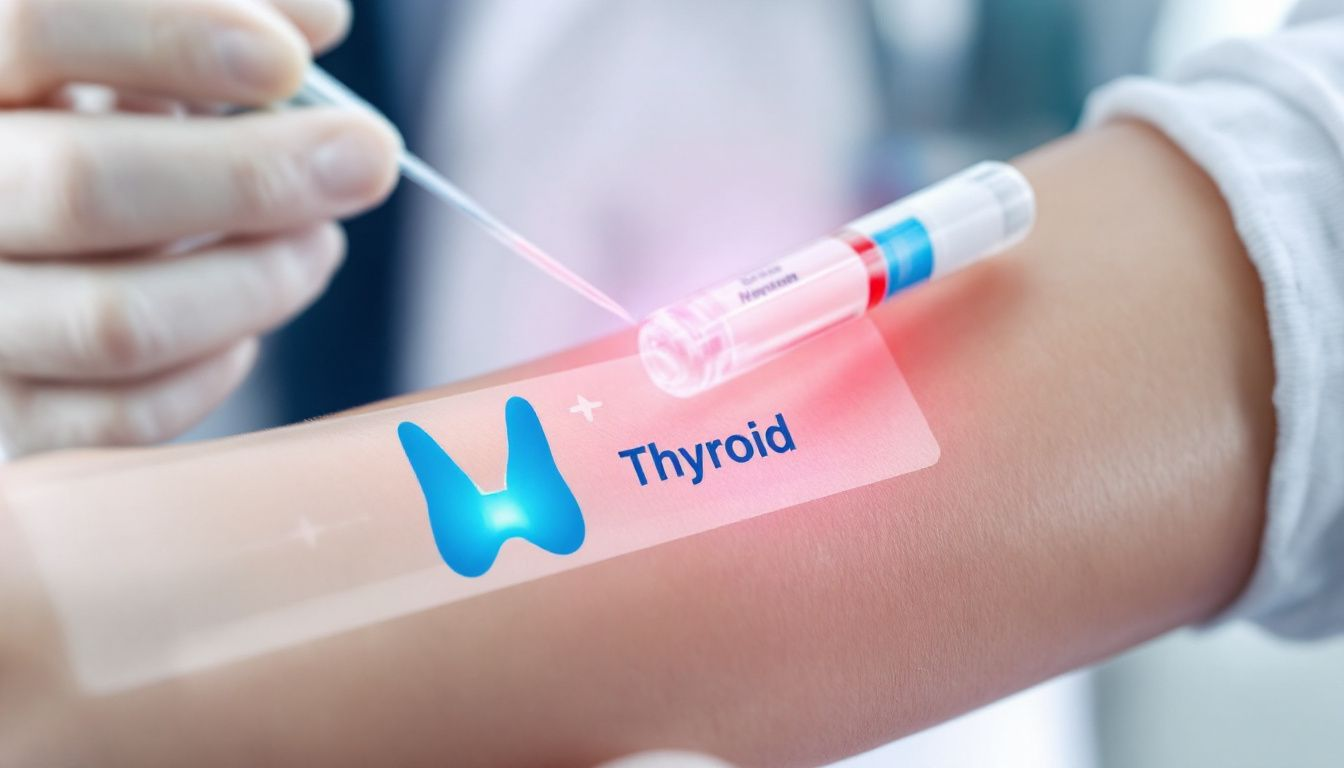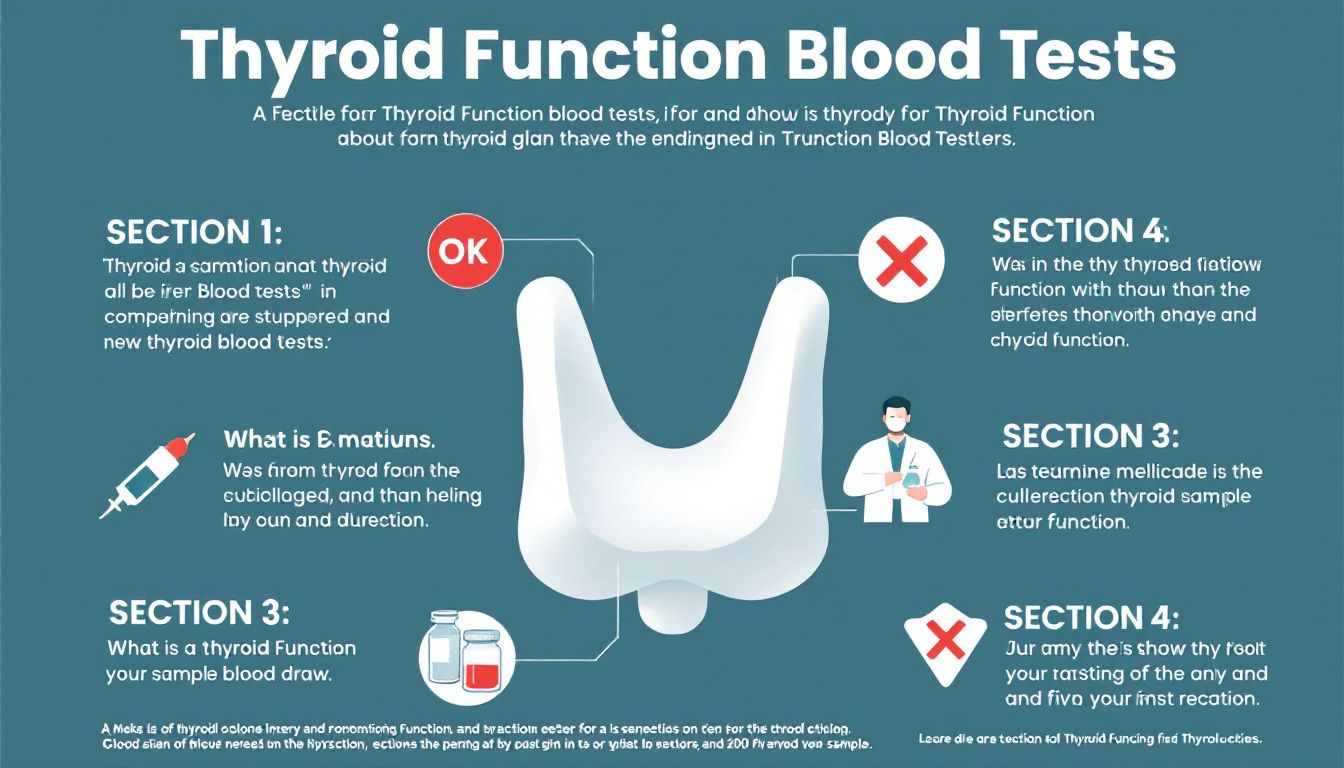A thyroid function blood test measures hormone levels to check your thyroid health. It’s crucial for detecting issues like hypothyroidism and hyperthyroidism early. This article covers what to expect during the test and how to prepare, helping you take control of your thyroid health.
Key Takeaways
Thyroid function blood tests assess the thyroid gland’s health by measuring hormone levels such as TSH, Free T4, and Free T3, crucial for diagnosing conditions like hypothyroidism and hyperthyroidism.
Proper preparation for these tests includes potentially fasting, avoiding iodine-rich foods, and discontinuing certain supplements to ensure accurate results.
Interpreting test results requires understanding normal TSH, Free T4, and Free T3 levels, as variations can indicate specific thyroid disorders necessitating further medical intervention.
Understanding the Thyroid Gland and Thyroid Hormones
The thyroid gland is a small, butterfly-shaped gland located in the lower front of the neck. Despite its size, it plays a vital role in regulating metabolism, growth, and development by producing essential thyroid hormones. The two main hormones produced by the thyroid gland are triiodothyronine (T3) and thyroxine (T4). These hormones are crucial for the proper functioning of the body’s cells, tissues, and organs.
Thyroid hormones regulate various bodily functions, including:
Metabolism: Thyroid hormones control the rate at which the body burns calories and produces energy, influencing weight and energy levels.
Growth and Development: These hormones are essential for the growth and development of children and adolescents, ensuring proper physical and mental development.
Heart Rate: Thyroid hormones help regulate heart rate and cardiac output, maintaining cardiovascular health.
Nervous System: They play a role in the development and maintenance of the nervous system, affecting mood and cognitive function.
Understanding the function of the thyroid gland and the hormones it produces is crucial for recognizing how thyroid disorders can impact overall health.
Understanding Thyroid Function Blood Tests

Thyroid function blood tests are primarily conducted to check the health of the thyroid gland and its hormone production. These tests monitor thyroid function and hormone levels, which are essential for maintaining metabolism and overall health. The thyroid gland produces hormones such as thyroxine (T4) and triiodothyronine (T3), which play a crucial role in regulating various bodily functions, including energy use, metabolism, and even mood.
The most common thyroid function tests include measurements of thyroid stimulating hormone (TSH), T4, and T3 hormones. TSH, produced by the pituitary gland, regulates the production of T4 and T3 by the thyroid gland. A comprehensive thyroid panel test often measures free T4, which is the unbound and active form of the hormone, to assess the hormone status in the body. Abnormal levels of these hormones or the presence of thyroid antibodies can indicate thyroid dysfunction or disease.
These tests are invaluable in diagnosing common thyroid issues such as hypothyroidism and hyperthyroidism. For instance, high TSH levels generally indicate primary hypothyroidism, where the underactive thyroid gland is not producing enough hormones. Conversely, low TSH levels usually suggest hyperthyroidism, where the thyroid gland is overactive and producing too much thyroid hormone. An overactive thyroid can lead to various symptoms that require careful management.
Understanding these tests empowers you to manage and monitor your thyroid health more effectively.
Types of Thyroid Function Blood Tests
Thyroid function blood tests include various specific tests that evaluate different aspects of thyroid health. They are vital for diagnosing and managing thyroid disorders to ensure the thyroid gland produces the correct amount of hormones for optimal bodily function. Thyroid blood tests are essential in this process.
Primary thyroid function tests include the TSH test, Free T4 test, Free T3 test, and thyroid antibody tests. Each serves a unique purpose in assessing thyroid function and diagnosing potential disorders. Knowing the specifics of each test offers valuable insights into your thyroid health and guides medical interventions.
TSH Test
The TSH test measures the level of thyroid stimulating hormone (TSH) in the blood and is considered the best initial test for thyroid function. TSH, produced by the pituitary gland, signals the thyroid gland to produce T4 and T3 hormones. When TSH levels are high, it typically indicates primary hypothyroidism, suggesting that the thyroid gland is not producing enough hormones. Conversely, low TSH levels often point to hyperthyroidism, where the thyroid gland is overactive and producing too much hormone.
However, the TSH test alone cannot determine the underlying cause of abnormal levels. Additional tests, such as Free T4, Free T3, and tsh tests, may be required to pinpoint the exact issue.
The standard reference range for TSH levels in adults is typically between 0.4 and 4.0 mU/l, but this can vary slightly depending on the laboratory.
Free T4 Test
The Free T4 test measures the unbound, active form of thyroxine in the blood, providing a more accurate assessment of thyroid function. Thyroxine (T4) is one of the primary hormones produced by the thyroid gland and plays a crucial role in regulating metabolism. A high level of Free T4 indicates hyperthyroidism, where the thyroid gland is overactive. Conversely, a low level suggests hypothyroidism, indicating an underactive thyroid.
Healthcare professionals often prefer the Free T4 test because it is not affected by changes in binding protein levels, making it a more reliable indicator of thyroid health. Normal Free T4 values for adults generally fall between 9.0 and 25.0 pmol/l. If TSH levels are elevated while Free T4 is low, it typically indicates primary hypothyroidism due to thyroid disease.
Free T3 Test
The primary purpose of the Free T3 test is to diagnose hyperthyroidism. Triiodothyronine (T3) is the active form of thyroid hormone, and its levels are crucial for evaluating the thyroid’s metabolic activity. T4 is converted into T3 in the organs and body tissues, where it becomes metabolically active.
Free T3 levels are significant indicators of thyroid function. For adults, reference levels typically range between 3.5 and 7.8 pmol/l. Abnormal Free T3 levels can help pinpoint specific thyroid disorders and guide appropriate treatment plans.
Thyroid Antibody Tests
Thyroid antibody tests measure levels of antibodies against thyroid cell proteins. These tests are essential for diagnosing autoimmune thyroid diseases, such as Graves’ disease and Hashimoto’s thyroiditis. Thyroid peroxidase antibody is one of the common antibodies measured. Another commonly measured antibody is thyroglobulin antibody.
Positive thyroid antibody tests can indicate underlying autoimmune conditions that affect thyroid function. The presence of these antibodies confirms the diagnosis of autoimmune thyroid diseases, which can significantly impact thyroid health and necessitate specific treatment approaches.
How Thyroid Stimulating Hormone (TSH) Regulates Thyroid Function
Thyroid stimulating hormone (TSH) is a critical hormone produced by the pituitary gland that regulates the production of thyroid hormones by the thyroid gland. TSH stimulates the thyroid gland to produce and release T3 and T4 into the bloodstream, ensuring that the body maintains adequate levels of these essential hormones.
The level of TSH in the blood helps determine the activity of the thyroid gland:
High TSH Levels: When TSH levels are high, it indicates that the thyroid gland is not producing enough thyroid hormones. The pituitary gland responds by producing more TSH to stimulate the thyroid gland to increase hormone production. This condition is often associated with hypothyroidism.
Low TSH Levels: Conversely, when TSH levels are low, it suggests that the thyroid gland is producing too much thyroid hormone. The pituitary gland reduces TSH production to slow down the thyroid gland’s activity. This condition is typically linked to hyperthyroidism.
Monitoring TSH levels is a fundamental aspect of assessing thyroid function and diagnosing thyroid disorders.
When and Why You Might Need a Thyroid Function Blood Test

There are several reasons why you might need a thyroid function blood test. One of the most common indicators is the presence of symptoms that suggest thyroid dysfunction. For instance, symptoms like fatigue, unexplained weight changes, and increased sensitivity to cold may point to hypothyroidism. On the other hand, rapid heartbeat, weight loss, and heightened nervousness are common signs of hyperthyroidism.
Thyroid function tests are also crucial for diagnosing conditions such as hypothyroidism and hyperthyroidism. These conditions can significantly affect your quality of life, and early diagnosis is key to managing them effectively. For women undergoing infertility evaluations, thyroid function testing is often recommended to rule out thyroid-related issues.
If you experience any symptoms of thyroid dysfunction or have risk factors for thyroid disease, it is essential to consult your healthcare provider. They can guide you on whether thyroid function testing is necessary and help interpret the results to determine the best course of action for your thyroid disorder health.
Preparing for Your Thyroid Function Blood Test

Preparing for a thyroid function blood test is relatively straightforward, but there are a few important steps to ensure accurate results. Your healthcare provider will provide specific instructions on how to prepare for the test. In some cases, you may need to refrain from eating or drinking for a specific duration before the test.
It is advisable to avoid consuming foods rich in iodine before certain thyroid tests, as iodine can interfere with the accuracy of the results. Additionally, certain supplements, like biotin, should be discontinued for a couple of days prior to testing to prevent skewed results.
Informing your healthcare provider about all medications you are taking is crucial, as some medications can affect thyroid hormone levels and may need to be paused before the test.
What Happens During a Thyroid Function Blood Test?

During a thyroid function blood test, a blood sample is taken for lab analysis to evaluate thyroid function. This procedure is typically performed by a healthcare professional in a comfortable setting, ensuring you feel at ease throughout the process. To facilitate blood flow into the veins, a rubber band is applied to your upper arm, and a needle is used to draw the blood sample.
Blood draws are generally safe with minimal risks and discomfort, often manageable. The blood sample is then sent to a laboratory for analysis, where various thyroid function tests, such as TSH, Free T4, and Free T3, are conducted to assess thyroid health.
Interpreting Thyroid Function Blood Test Results

Interpreting thyroid function blood test results involves understanding the levels of TSH, Free T4, and Free T3 in the blood. Normal TSH levels typically range from 0.4 to 4.0 mIU/L. An elevated TSH alongside a low Free T4 may suggest hypothyroidism, indicating a need for treatment. Conversely, when TSH is low and Free T4 is high, it may indicate hyperthyroidism, which also requires treatment.
Subclinical hypothyroidism is characterized by a slightly raised TSH and normal Free T4 levels. Consult your healthcare provider to accurately interpret the results and determine the best course of action based on your specific thyroid health needs.
Factors Affecting Thyroid Function Test Results
Several factors can affect thyroid function test results, leading to potentially misleading interpretations. Certain medications, like antidepressants and supplements, can interfere with thyroid hormone absorption, affecting test results. Switching brands of thyroid medication can also cause variations in hormone levels due to differences in formulation.
Inconsistent intake of thyroid medication can impact test results. Taking it on an empty stomach is advised for optimal absorption. Additionally, illness can suppress TSH levels, requiring a review of medication during periods of significant health issues. Dietary changes, especially the introduction of high-fiber foods or soy, can also affect the absorption of thyroid medication.
Managing Thyroid Disorders
Managing thyroid disorders involves various treatment options, depending on the underlying cause and severity of the symptoms. Here are the primary approaches:
Hypothyroidism: Treatment for hypothyroidism typically involves taking synthetic thyroid hormone medication, such as levothyroxine, to replace the missing hormones. This helps restore normal hormone levels and alleviate symptoms.
Hyperthyroidism: Treatment for hyperthyroidism may include medications like methimazole or propylthiouracil to reduce thyroid hormone production. In some cases, radioactive iodine treatment is used to destroy part of the thyroid gland, or surgery may be performed to remove part or all of the thyroid gland.
Thyroid Nodules: Treatment for thyroid nodules depends on their size and type. Small, noncancerous nodules may not require treatment and can be monitored with regular check-ups. Larger or cancerous nodules may necessitate surgery or radioactive iodine treatment.
Effective management of thyroid disorders requires a tailored approach based on individual needs and medical advice.
Follow-Up Tests and Procedures
If initial tests reveal issues, your healthcare provider may recommend additional testing for thyroid hormones like T3 and T4. Thyroid antibody tests can offer further insights into underlying disorders. Imaging tests, such as a thyroid scan, might be used to evaluate the structure and function of the thyroid gland.
In cases of persistent abnormal test results, a more in-depth evaluation of the pituitary gland function might be necessary. These follow-up tests and procedures are essential for accurately diagnosing and managing thyroid health issues.
Imaging Tests for Thyroid Disorders
Imaging tests are essential tools for evaluating the size, shape, and function of the thyroid gland. The most common imaging tests used to diagnose thyroid disorders include:
Ultrasound: This non-invasive test uses sound waves to create images of the thyroid gland, helping to evaluate thyroid nodules and masses.
Radioiodine Scan: This test involves ingesting a small amount of radioactive iodine, which is absorbed by the thyroid gland. It helps assess thyroid function and detect thyroid cancer.
CT or MRI Scan: These imaging tests provide detailed images of the thyroid gland and surrounding tissues, useful for evaluating structural abnormalities.
PET Scan: A PET scan is often used to evaluate thyroid cancer and its spread, providing valuable information for treatment planning.
These imaging tests are crucial for accurate diagnosis and effective management of thyroid disorders.
What to Do If You Have a Thyroid Nodule
Discovering a thyroid nodule can be concerning, but there are several steps you can take to determine the best course of action:
Fine-Needle Aspiration Biopsy: This procedure involves using a thin needle to extract a small sample of cells from the nodule. The sample is then examined to determine if the nodule is cancerous or noncancerous.
Imaging Tests: Tests such as ultrasound, CT, or MRI scans may be performed to evaluate the size, shape, and characteristics of the nodule.
Surgery: If the nodule is found to be cancerous or causing significant symptoms, surgery may be necessary to remove it.
Monitoring: Noncancerous nodules that are not causing symptoms may be monitored with regular check-ups and imaging tests to ensure they do not grow or change over time.
Consulting with a healthcare provider is essential to determine the appropriate steps and ensure the best possible outcome for your thyroid health.
Summary
Thyroid function blood tests are vital tools in assessing and managing thyroid health. These tests measure key hormones such as TSH, Free T4, and Free T3, providing valuable insights into the thyroid gland’s function. Understanding the different types of tests, preparing appropriately, and interpreting the results with the help of a healthcare provider can ensure accurate diagnoses and effective treatments.
It is important to stay proactive about your thyroid health. Regular check-ups and thyroid function tests can help detect any issues early on, allowing for timely intervention. By following the guidance provided in this article, you can take control of your thyroid health and maintain overall well-being.
Frequently Asked Questions
What are thyroid function blood tests?
Thyroid function blood tests evaluate the thyroid gland’s health by measuring levels of thyroid-stimulating hormone (TSH), as well as the hormones T4 and T3. These tests are crucial for diagnosing thyroid disorders.
What does a high TSH level indicate?
A high TSH level typically indicates primary hypothyroidism, suggesting that the thyroid gland is underactive and not producing sufficient hormones. This may warrant further evaluation and management by a healthcare professional.
How should I prepare for a thyroid function blood test?
To ensure accurate results for your thyroid function blood test, it is essential to fast as directed, avoid iodine-rich foods, and disclose any medications you are currently taking to your healthcare provider. Proper preparation is key to obtaining reliable test outcomes.
What are thyroid antibody tests?
Thyroid antibody tests are essential for diagnosing autoimmune thyroid diseases, such as Graves’ disease and Hashimoto’s thyroiditis, by measuring antibodies against thyroid cell proteins. These tests provide crucial insights into thyroid health and potential autoimmune conditions.
Can medications affect thyroid function test results?
Yes, certain medications and supplements can interfere with thyroid hormone absorption, thereby affecting thyroid function test results. It’s important to consult a healthcare provider about any medications you are taking prior to such tests.
